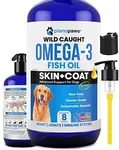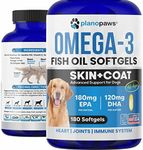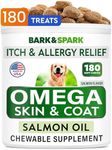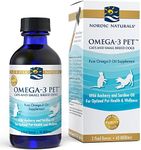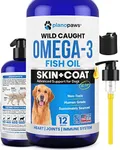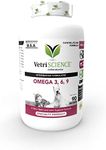Buying Guide for the Best Dog Fish Oils
Choosing the right fish oil supplement for your dog can make a big difference in their overall health, especially for their skin, coat, joints, and heart. With so many options available, it's important to understand what makes a fish oil product suitable for your dog's specific needs. By focusing on a few key specifications, you can confidently select a supplement that will benefit your pet the most.Source of Fish OilThe source of fish oil refers to the type of fish used to produce the oil, such as salmon, sardines, anchovies, or mackerel. This is important because different fish have varying levels of beneficial fatty acids and potential contaminants. Generally, smaller fish like anchovies and sardines are considered to have lower levels of toxins. If your dog has allergies or sensitivities, you may want to choose a single-source oil. For most dogs, any high-quality, reputable source is suitable, but if your dog has specific health needs or sensitivities, consult your vet about the best source.
Omega-3 Content (EPA and DHA)Omega-3 content, especially EPA (eicosapentaenoic acid) and DHA (docosahexaenoic acid), is a measure of the beneficial fatty acids in the oil. These are the main components that support your dog's skin, coat, joints, and brain health. Fish oils vary in their EPA and DHA levels, with some being more concentrated than others. Lower concentrations are fine for general wellness, while higher concentrations may be better for dogs with specific health issues like joint pain or skin problems. Check the label for the amount of EPA and DHA per serving and match it to your dog's size and health needs.
Purity and TestingPurity and testing refer to how the fish oil is processed and whether it has been checked for contaminants like heavy metals, PCBs, and other toxins. This is crucial because fish can accumulate harmful substances from the environment. Look for products that mention third-party testing or certifications for purity. If your dog is sensitive or you want extra peace of mind, prioritize oils that are clearly labeled as purified and tested.
Form of Fish OilFish oil for dogs comes in different forms, such as liquid, softgel capsules, or chews. The form affects how easy it is to give to your dog and how well it is absorbed. Liquids can be mixed with food and are good for picky eaters, while capsules or chews are convenient for travel or precise dosing. Choose the form that best fits your dog's preferences and your routine.
Additives and FlavoringsSome fish oils contain added flavors, preservatives, or other ingredients to improve taste or shelf life. While these can make the oil more appealing to your dog, some additives may cause allergies or sensitivities. If your dog has a sensitive stomach or allergies, look for products with minimal or no added ingredients. For most dogs, a simple, natural oil is the best choice.
Shelf Life and PackagingFish oil can spoil if not stored properly, so shelf life and packaging are important. Dark bottles and airtight containers help protect the oil from light and air, which can cause it to go rancid. If you don't use fish oil quickly, choose smaller bottles or packaging that helps preserve freshness. Always check the expiration date and store the oil as recommended.
